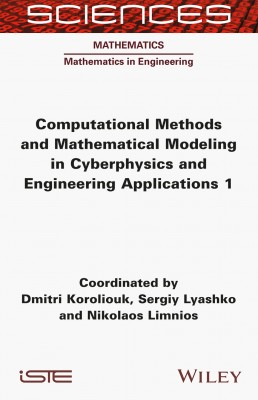
Edited by
Dmitri Koroliouk, National Technical University of Ukraine “Igor Sikorsky Kyiv Polytechnic Institute”, Ukraine.
Sergiy Lyashko, Taras Shevchenko National University of Kyiv, Ukraine.
Nikolaos Limnios, Université de Technologie de Compiègne, France.
Mathematical methods in engineering are characterized by a wide range of techniques for approaching various problems. Moreover, completely different analysis techniques can be applied to the same problem, which is justified by the difference in specific applications. Therefore, the study of the analyses and solutions of specific problems leads the researcher to generate their own techniques for the analysis of similar problems continuously arising in the process of technical development.
Computational Methods and Mathematical Modeling in Cyberphysics and Engineering Applications contains solutions to specific problems in current areas of computational engineering and cyberphysics.
1. The Hydrodynamic-type Equations and the Solitary Solutions, Sergiy Lyashko, Valerii Samoilenko, Yuliia Samoilenko and Ihor Gapyak.
2. The Nonlinear WKB Technique and Asymptotic Soliton-like Solutions to the Korteweg–de Vries Equation with Variable Coefficients and Singular Perturbation, Sergiy Lyashko, Valerii Samoilenko, Yuliia Samoilenko and Evgen Vakal.
3. Asymptotic Analysis of the vcKdV Equation with Weak Singularity, Sergiy Lyashko, Valerii Samoilenko, Yuliia Samoilenko and Nataliia Lyashko.
4. Modeling of Heterogeneous Fluid Dynamics with Phase Transitions and Porous Media, Gennadiy V. Sandrakov.
5. Mathematical Models and Control of Functionally Stable Technological Process, Volodymyr Pichkur, Valentyn Sobchuk and Dmytro Cherniy.
6. Alternative Direction Multiblock Method with Nesterov Acceleration and Its Applications, Vladislav Hryhorenko, Nataliia Lyashko, Sergiy Lyashko, and Dmytro Klyushin.
7. Modified Extragradient Algorithms for Variational Inequalities, Vladimir V. Semenov and Sergey V. Denisov.
8. On Multivariate Algorithms of Digital Signatures on Secure El Gamal-Type Mode, Vasyl Ustimenko.
9. Metasurface Model of Geographic Baric Field Formation, Dmitri Korioliouk, Maksym Zoziuk, Pavlo Krysenko, and Yuriy Yakymenko.
10. Simulation of the Electron–Hole Plasma State by Perturbation Theory Methods, Andrii Bomba, Sergiy Lyashko and Ihor Moroz.
11. Diffusion Perturbations in Models of the Dynamics of Infectious Diseases Taking into Account the Concentrated Effects, Serhii Baranovsky, Andrii Bomba, Sergiy Lyashko and Oksana Pryshchepa.
12. Solitary Waves in the “Shallow Water” Environments, Yurii Turbal, Mariana Turbal and Andrii Bomba.
13. Instrument Element and Grid Middleware in Metrology Problems, Pavlo Neyezhmakov, Stanislav Zub, Sergiy Lyashko, Irina Yalovega and Nataliia Lyashko.
14. Differential Evolution for Best Uniform Spline Approximation, Larysa Vakal and Evgen Vakal.
15. Finding a Nearest Pair of Points Between Two Smooth Curves in Euclidean Space, Vladimir V. Semenov, Nataliia Lyashko, Stanislav Zub and Yevhen Havrylko.
16. Constrained Markov Decision Process for the Industry, Michel Boussemart and Nikolaos Limnios.
Dmitri Koroliouk is a Doctor of Sciences, Professor at the National Technical University of Ukraine “Igor Sikorsky Kyiv Polytechnic Institute”, and leading researcher at the Institute of Mathematics, and at the Institute of Telecommunications and Global Information Space of the National Academy of Sciences of Ukraine. He is also Head of the Digital Innovation Laboratory at UNESCO Interdisciplinary Chair in Biotechnology and Bioethics at the University of Rome Tor Vergata, Italy.
Sergiy Lyashko is Head of the Department of Computational Mathematics at the Faculty of Computer Sciences and Cybernetics, Taras Shevchenko National University of Kyiv, and a professor at the National Academy of Sciences of Ukraine. His research interests concern problems of singular optimal control of linear systems.
Nikolaos Limnios is a professor at the Laboratoire de Mathématiques Appliquées, Université de Technologie de Compiègne, France. His research interests concern statistical inference for stochastic processes and
semi-Markov processes.